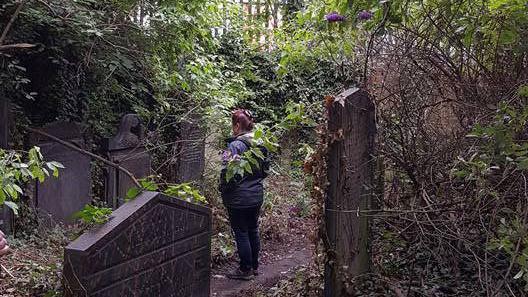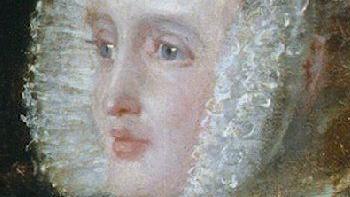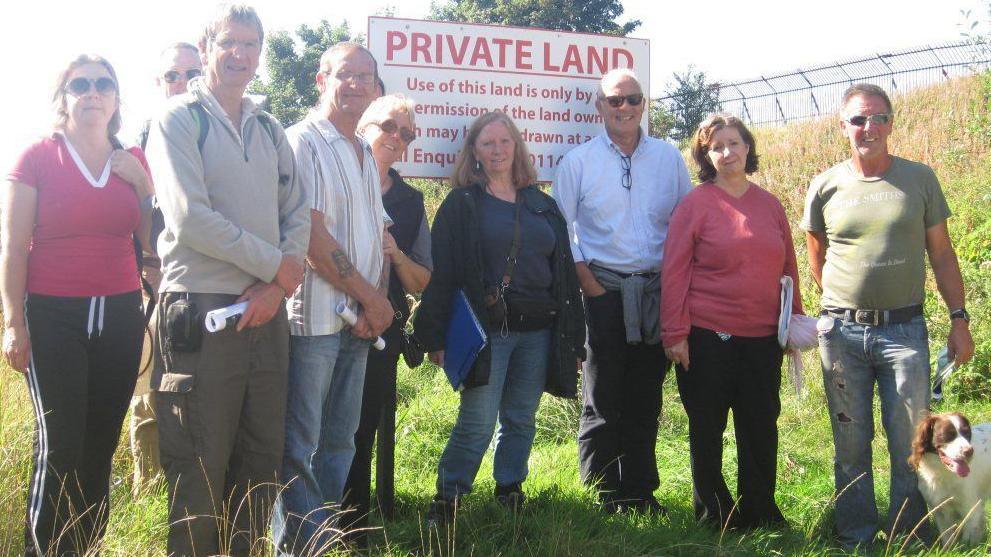Open events mark bicentenary of anti-slavery group

The grave of campaigner Mary Anne Rawson in Zion Graveyard
- Published
Events are taking place to mark the 200th anniversary of an anti-slavery campaign group.
The Sheffield Ladies Anti-Slavery Society was launched by campaigner Mary Ann Rawson and her mother, Elizabeth Read, in 1825 to call for the immediate and universal abolition of slavery.
Over the weekend, the Friends of Zion Graveyard in Attercliffe are holding open days, talks and guided tours around the cemetery where Mrs Rawson and the Read family are buried and the family church, Upper Wincobank Chapel.
Volunteer Penny Rea said it was important for people to remember the group, which was visited by abolitionists such as William Wilberforce and Frederick Douglass.
While the buying and selling of enslaved people within the British Empire ended with the 1807 Abolition of the Slave Trade Act it did not protect those already enslaved.
Ms Rea said: "Mary Anne was writing to the great and good all over the world to get them to put their objections to slavery and particularly the apprenticeship of the slaves after the abolition of slavery."

Anti-slavery campaigner Mary Ann Rawson was buried in Zion Graveyard in Attercliffe
The Friends of Zion Graveyard bought the site in 2017.
"We've spent five years clearing it, uncovering graves, researching the relatives, and finding the grave of Mary Ann Rawson and the Read family," said Ms Rea.
"We've got both the chapel and the graveyard open. The chapel's open on Saturday and the graveyard's open on Sunday, so we can tell the story of this remarkable family and the community."
Mary Ann Rawson was the daughter of Joseph and Elizabeth Read who owned Wincobank Hall and had inherited Sheffield Smelting Company, later Thessco, from Joseph's father.
She was later married to banker William B Rawson.
Upper Wincobank Chapel was the church of the Read family, who were non-conformist Christians.
"Mary Ann's parents saw Wincobank as an ideal conference centre and they used to get all the travelling speakers that came through," said Ms Rea.
"The radical speakers and thinkers of the day came to Wincobank Hall and would bring their friends together.
"They had missionaries, William Wilberforce, David Livingston's father-in-law Robert Moffat, and later on Frederick Douglass, who was a freed slave from the West Indies came to speak here," she said.
Upper Wincobank Chapel will be open from 12:00 BST to 16:00 on Saturday, with guided tours around the building and talks about the bicentenary of the Anti-Slavery Society.
A guided walk up Wincobank Hill will take place in the afternoon at 14:30 and Zion Graveyard in Attercliffe will be open from 12:00 to 16:00 on Sunday.
Get in touch
Tell us which stories we should cover in Yorkshire
Listen to highlights from South Yorkshire on BBC Sounds, catch up with the latest episode of Look North
Related topics
Related stories
- Published19 December 2024
